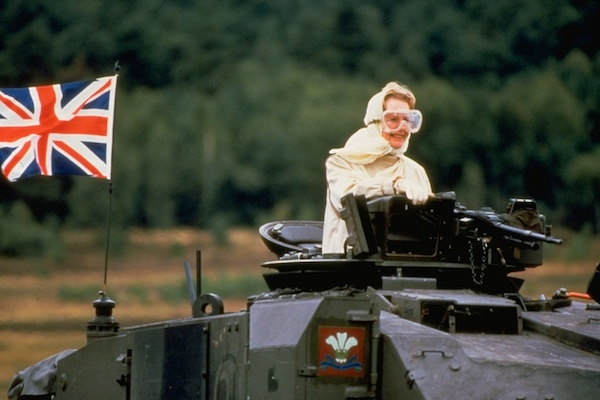A little rejoicing is now in order, but only a little. We may rejoice that the Falklands war did not end in a bloodbath at Port Stanley, that the Argentinians did not stage a last doomed defence of the islands’ capital. We may rejoice at the performance of our armed forces who have conducted themselves with great skill and courage and with as much humanity as is possible in war. We may rejoice that they achieved their objectives, for to have lost a war against the Argentinians would have been an unthinkable disaster. We may rejoice that the conflict has accelerated the decline of the British Labour party. We may rejoice that the vain and indescribably stupid leader of the Argentinian junta, General Galtieri, has been frustrated in his imbecile plans of conquest and that Argentina may, as a result, find itself a worthier government.
But has the operation been worthwhile? Has, for example, the British government achieved the two purposes for which it said it was fighting — that armed aggression should not be allowed to pay and that the Falkland Islanders should be allowed to live under the government of their choice? In a narrow sense, the answer is yes. Argentinian aggression has certainly not been allowed to pay; on the contrary, it has brought disaster to that unfortunate country.
But if anyone imagines that Britain’s example in the South Atlantic is likely to inhibit would-be aggressors anywhere else, he must be of an agreeably optimistic disposition. Certainly Israel has not felt inhibited. And did the Prime Minister really believe what she was saying on Tuesday when she announced to a jubilant House of Commons: ‘Let every nation know that where there is British sovereign territory, it will be well and truly defended’? Would we fight for Gibraltar? Would we fight for Hong Kong? She hasn’t, as she claimed, ‘restored once again the dominance of Britain’; she has shown — and this is already quite impressive — that her government is ready to defend British sovereign territory where this is possible: in the Falklands, in other words.
As for the Falkland Islanders, they are now once again under the sort of government they prefer, namely a British one. But victory does not ensure that this situation will continue in perpetuity. It would only ensure this if the Argentinians were to drop their claim to the islands, and all the evidence is that they are no more likely to so now than they were before. The islands’ security and their economic development will continue to depend on some sort of deal with Argentina, a deal that has become no easier to achieve.
Already the British government has tacitly taken the first tiny step towards admitting this; the Governor is returning not as Governor, but as a ‘civil commissioner’. One of the trappings of colonial rule has thus been removed. I wonder what the Kelpers feel about this. In fact, I wonder what they feel about lots of things. What is in question is not their desire to remain British, but the quality of that desire. They would not, on the face of it, appear to be the most passionate of patriots. They lead strange, lonely lives many thousands of miles away from the mother country.
Many of them are only short-term workers, and the rest of them, according to Lord Shackleton in his 1976 report, show ‘lack of confidence and enterprise at the individual and community level, and a degree of acceptance of their situation which verges on apathy’. It is possible to imagine that, at the end of the day, they would value more highly the right to carry on their chosen way of life in security and tranquillity than the Britishness of the Falklands administration.
In the meantime, they are clearly grateful that the British have returned. They must be impressed by the amount of blood shed on their behalf. I am impressed too. The casualties on both sides exceed the total number of Falklanders. The deaths are more than half that number. Even the British dead, mercifully few though they are, amount to one seventh of that number. Those who early in the campaign argued the moral significance of this equation may be relieved that it is not worse, but they have no reason to feel that their anxieties were not justified.
But, as was predictable, the conduct and outcome of the war have assumed much greater importance than the reasons for fighting it. Ironically, it was the very shortage of Falklanders that made the war possible. Had those remote islands been heavily populated, the risks of ousting the Argentinians by force would have been too great for the British to contemplate.
The Falklands provided an almost ideal environment for a duel of honour between Mrs Thatcher and General Galtieri. Both sides acquitted themselves well. The British achievement was brilliant, but the Argentinians also performed great feats of courage — particularly the airmen — and they did not succumb to the temptation of using the islanders as hostages. Even the islanders themselves say that the Argentinians did not treat them badly.
In Britain, the political consequences of the war have been considerable. Despite the horror of the modern weapons employed, it was a very old-fashioned war, conducted in a limited theatre, with little danger to civilians, and dependent to a great extent on the courage and skills of the men involved. It has done a great service to the Conservative party by making Conservatism seem respectable again. People can now finally see the point of Mrs Thatcher and feel more comfortable with her. Set beside the Falklands conflict, even her economic policies appear no longer harsh but courageous. For a time the country looks set to be a more united and more contented place. This is the real cause for which so many people have died.






Comments